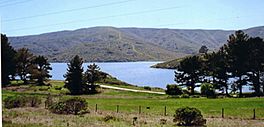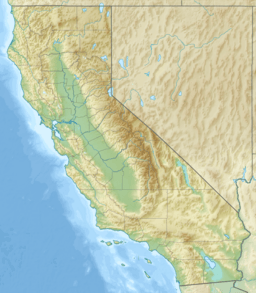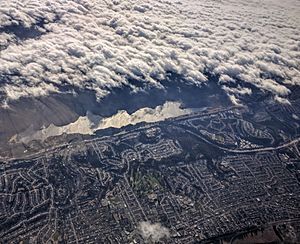San Andreas Lake facts for kids
Quick facts for kids San Andreas Lake |
|
|---|---|
 |
|
| Location | San Mateo County, California |
| Coordinates | 37°35′36″N 122°25′27″W / 37.5932°N 122.4241°W |
| Type | Reservoir |
| Primary inflows | San Andreas Creek |
| Primary outflows | San Andreas Creek |
| Catchment area | 4.4 sq mi (11 km2) |
| Basin countries | United States |
| Max. length | 4.8 km (3.0 mi) |
| Surface area | 550 acres (220 ha) |
| Water volume | 19,027 acre⋅ft (23,469,000 m3) |
| Surface elevation | 453 ft (138 m) |
| Settlements | Millbrae, California San Bruno |
San Andreas Lake is a large reservoir located near the cities of Millbrae and San Bruno in San Mateo County, California. This important lake sits right on top of the famous San Andreas Fault, which is actually named after the valley where the lake is found.
Contents
Discovering San Andreas Lake
The area around San Andreas Lake has a long history. Explorers first discovered the San Francisco Bay in 1769. The Portolá expedition, led by Gaspar de Portolá, traveled down a valley that is now called San Andreas Creek. They camped near where San Andreas Lake is today.
Early Explorers and Campsites
The explorers then reached a larger lake, which is now covered by the Upper Crystal Springs Reservoir. A special marker, California Historical Marker No. 94, shows where they camped. They even camped there a second time on their way back.
In 1774, Padre Palóu renamed the valley to Cañada de San Andrés. This was done on November 30, which is the feast day of St. Andrew.
Later, in 1776, Juan Bautista de Anza explored the area. He chose the spots for Mission San Francisco de Asís and the Presidio of San Francisco. On his return trip, he camped near San Mateo Creek. He wrote in his diary about reaching the "arroyo of San Andreas."
How San Andreas Lake Was Formed
San Andreas Lake was originally a small natural pond. It was made much bigger when a 100-foot-high earth dam was built in 1868.
The Lake and the San Andreas Fault
The dam was built directly over the San Andreas Fault. Even though the fault runs right under it, the dam survived the huge 1906 San Francisco earthquake!
In 1895, Professor Andrew Lawson from the University of California, Berkeley named the famous earthquake fault after this very lake.
Animals and Fish in the Lake
Before the dam was built in 1868, fish like coho salmon and coastal rainbow trout lived in the streams that fed into the lake. These fish could swim freely up and down the streams.
Fish Species in San Andreas Lake
After the dam was built, it likely trapped these fish. Scientists know that coho salmon were once in the San Mateo Creek area. Professor Alexander Agassiz collected samples of them in the 1850s and 1860s. An old description from 1877 also mentions "silver salmon" in San Andreas Lake.
Visiting San Andreas Lake
Because San Andreas Lake is a source of drinking water for the public, people cannot go swimming or boating in it. However, there are ways to enjoy the beautiful scenery around the lake.
Trails for Hikers and Cyclists
Hikers and bicyclists can use a paved trail along the eastern side of the lake. This trail runs next to Skyline Boulevard. Another path, called the Sawyer Camp Trail, crosses the rift valley on the San Andreas Dam. This trail is about 6 miles (10 km) long. It eventually leads to the Lower Crystal Springs reservoir and the Crystal Springs Dam.
See also
 In Spanish: Lago San Andrés para niños
In Spanish: Lago San Andrés para niños
 | Leon Lynch |
 | Milton P. Webster |
 | Ferdinand Smith |




